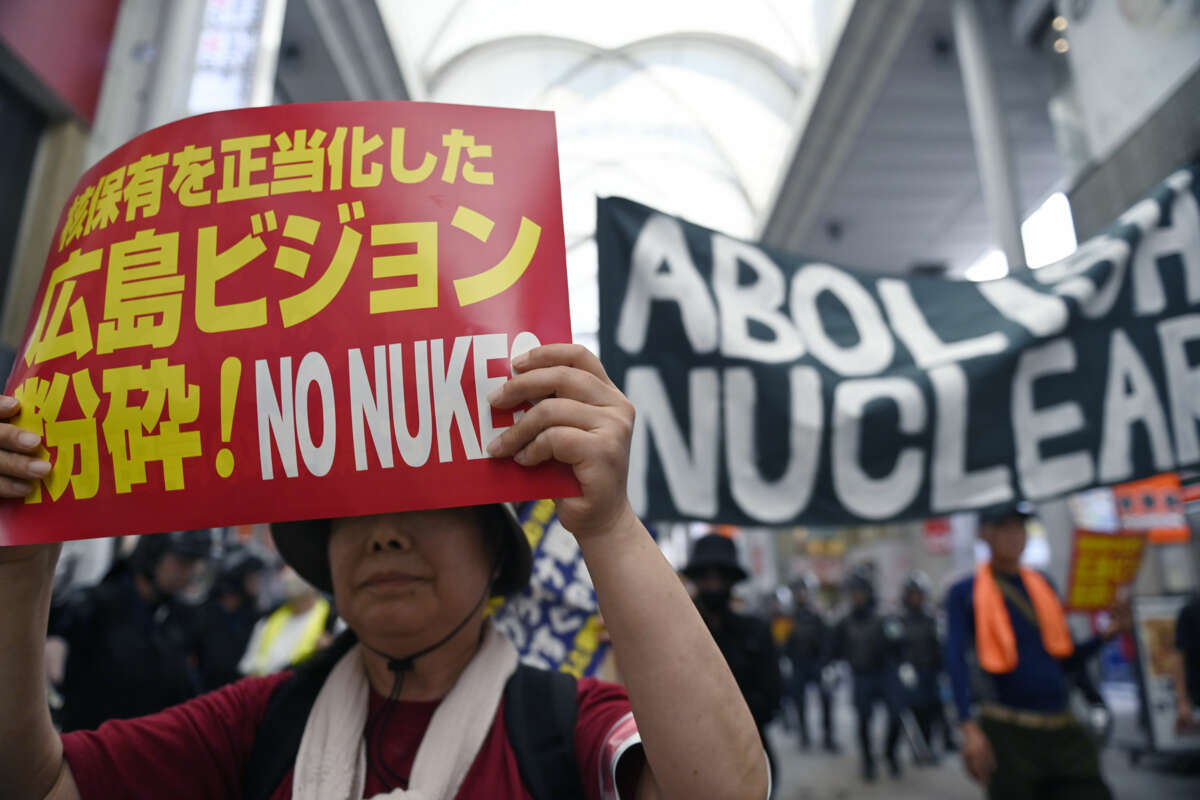Did you know that Truthout is a nonprofit and independently funded by readers like you? If you value what we do, please support our work with a donation.
Local, national, and global leaders warned of the dangers of nuclear weapons as they commemorated the 78th anniversary of the dropping of an atomic bomb on the city of Hiroshima Sunday.
This year’s anniversary comes as the release of the film Oppenheimer has offered a high-profile reminder of the history of the atomic bomb and as nuclear tensions in the current day have heightened, in part due to Russia’s invasion of Ukraine. At the start of the year, the Bulletin of the Atomic Scientists moved their doomsday clock to 90 seconds to midnight.
“Leaders around the world must confront the reality that nuclear threats now being voiced by certain policymakers reveal the folly of nuclear deterrence theory,” Hiroshima Mayor Kazumi Matsui said during his peace address at the commemoration ceremony in Hiroshima Sunday, as The Associated Press reported. “They must immediately take concrete steps to lead us from the dangerous present toward our ideal world.”
Matsui’s remarks responded in part to the Group of Seven summit in the city in May, during which world leaders put out a statement that anti-nuclear advocates considered a major disappointment.
In that statement, the leaders agreed that no country should use nuclear weapons, but that merely possessing the weapons could still “serve defensive purposes, deter aggression, and prevent war and coercion,” according to AP. Since then, former Russian President and current deputy chair of that country’s Security Council Dmitry Medvedev threatened nuclear war if a NATO-backed Ukrainian offensive reclaims land annexed illegally by Russia.
Hiroshima’s Gov. Hidehiko Yuzai agreed with its mayor that deterrence had failed.
“Believers of proactive nuclear deterrence, who say nuclear weapons are indispensable to maintain peace, are only delaying the progress toward nuclear disarmament,” Yuzai said, according to AP.
The U.S. dropped an atomic bomb on Hiroshima on August 6, 1945, at 8:15 am local time. A second bomb was dropped on Nagasaki on August 9. The two bombings killed between 110,000 and 210,000 people, according to the Bulletin of the Atomic Scientists. Those who survived, called hibakusha in Japan, still contend with sickness and injury from the bombings even as they advocate for a nuclear free world, according to AP.
“For 78 years, the city of Hiroshima and the hibakusha have worked tirelessly to ensure that nuclear weapons are never used again,” United Nations Secretary-General António Guterres said in remarks delivered at Sunday’s ceremony by Under-Secretary-General and High Representative for Disarmament Affairs Izumi Nakamitsu.
People began to light candles and incense and pray at a memorial for the victims of the Hiroshima bombings as the sun rose on Sunday, according to The Washington Post. At the exact time of the bombing, a peace bell rang out, followed by a moment of silence, Reuters reported. Around 50,000 people attended the ceremony in 86°F heat.
Among them was Japanese Prime Minister Fumio Kishida, who also called for peace.
“The tragedies of Hiroshima and Nagasaki caused by nuclear weapons must never be repeated,” he said. “As the only country to have experienced the horror of nuclear devastation in war, Japan will press on tirelessly with its efforts to bring about ‘a world without nuclear weapons’ while continuing to firmly uphold the ‘Three Non-Nuclear Principles.'”
Kishida added that this work had become “more difficult,” in part because of disagreements over disarmament and threats from Russia.
“But it is precisely because of these circumstances that it is imperative for us to reinvigorate international momentum once more towards the realization of a ‘world without nuclear weapons,'” he continued.
Kishida has been criticized in Japan by survivors for not signing the Treaty on the Prohibition of Nuclear Weapons, according to AP. The prime minister, for his part, has argued such an act would not be effective, since no country currently possessing nuclear weapons has signed the agreement.
Guterres, through Nakamitsu, spoke out in favor of the treaty, as well as the Treaty on Non-Proliferation of Nuclear Weapons.
“World leaders have visited this city, seen its monuments, spoken with its brave survivors, and emerged emboldened to take up the cause of nuclear disarmament,” Guterres said. “More should do so, because the drums of nuclear war are beating once again.”
And he was clear about what must be done to silence them.
“The only way to eliminate the nuclear risk,” Guterres said, “is to eliminate nuclear weapons.”
Trump is silencing political dissent. We appeal for your support.
Progressive nonprofits are the latest target caught in Trump’s crosshairs. With the aim of eliminating political opposition, Trump and his sycophants are working to curb government funding, constrain private foundations, and even cut tax-exempt status from organizations he dislikes.
We’re concerned, because Truthout is not immune to such bad-faith attacks.
We can only resist Trump’s attacks by cultivating a strong base of support. The right-wing mediasphere is funded comfortably by billionaire owners and venture capitalist philanthropists. At Truthout, we have you.
Our fundraising campaign is over, but we fell a bit short and still need your help. Please take a meaningful action in the fight against authoritarianism: make a one-time or monthly donation to Truthout. If you have the means, please dig deep.
